Spotlight On the Cyclists Feeding Their Community
Austin Bicycle Meals delivers food, water, survival supplies, and popsicles by the coolerful to those in need.
Spotlight On the Cyclists Feeding Their Community
Austin Bicycle Meals delivers food, water, survival supplies, and popsicles by the coolerful to those in need.
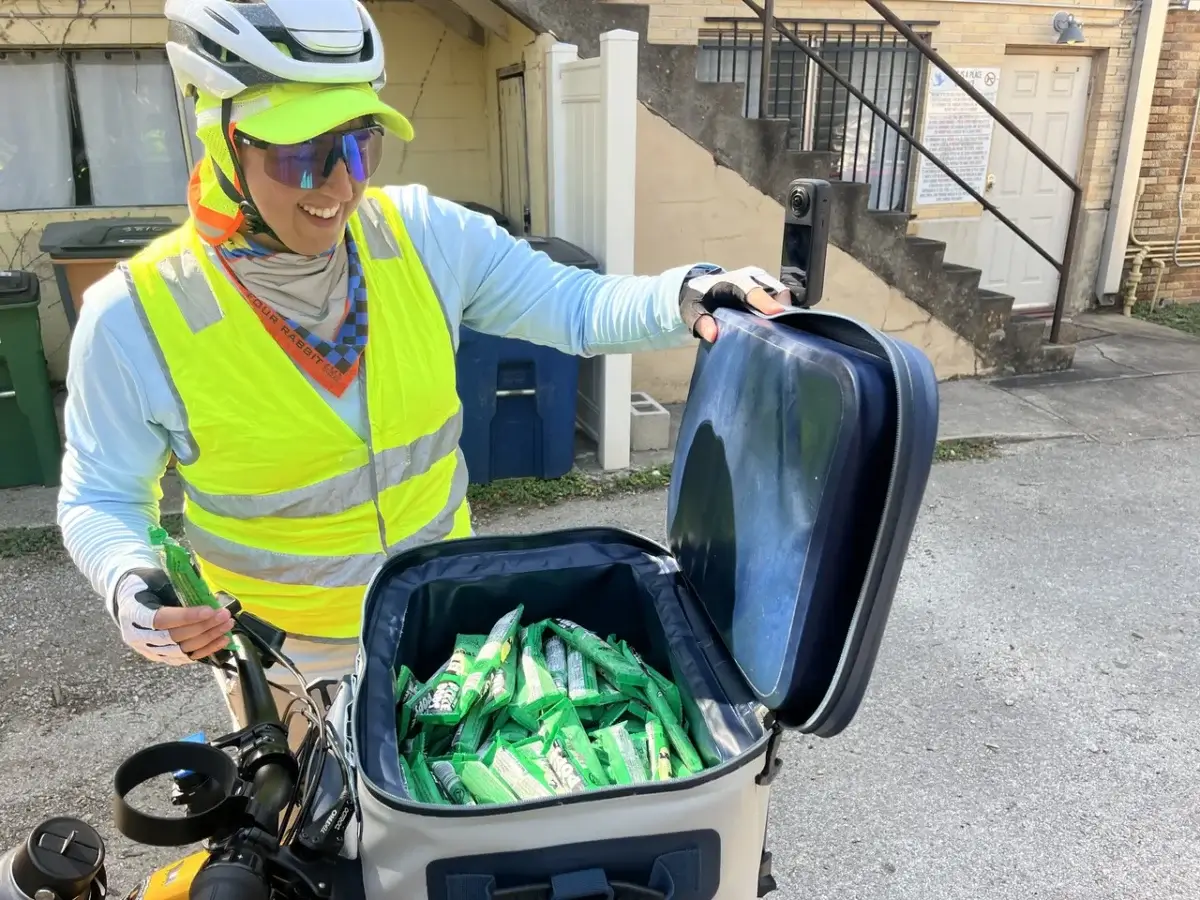
An ABM volunteer with the popular popsicle cooler.Photography by Katie Hill.
Waiting at a busy intersection amid rush-hour traffic, a gang of nearly 20 cyclists in matching neon vests catches the eye. They look like something between an emergency response force and a recreational biking club that thrives on bright colors and smiles.
In reality, Austin Bicycle Meals (ABM) is some combination of both.
The group rides around Texas’ big, quirky capital with coolers of water and food in clamshell to-go containers, all for the city’s unhoused community. Some cyclists carry backpacks of hygiene products. All the riders have been alerted to which of the many coolers holds the popsicles, one of their most requested food items.
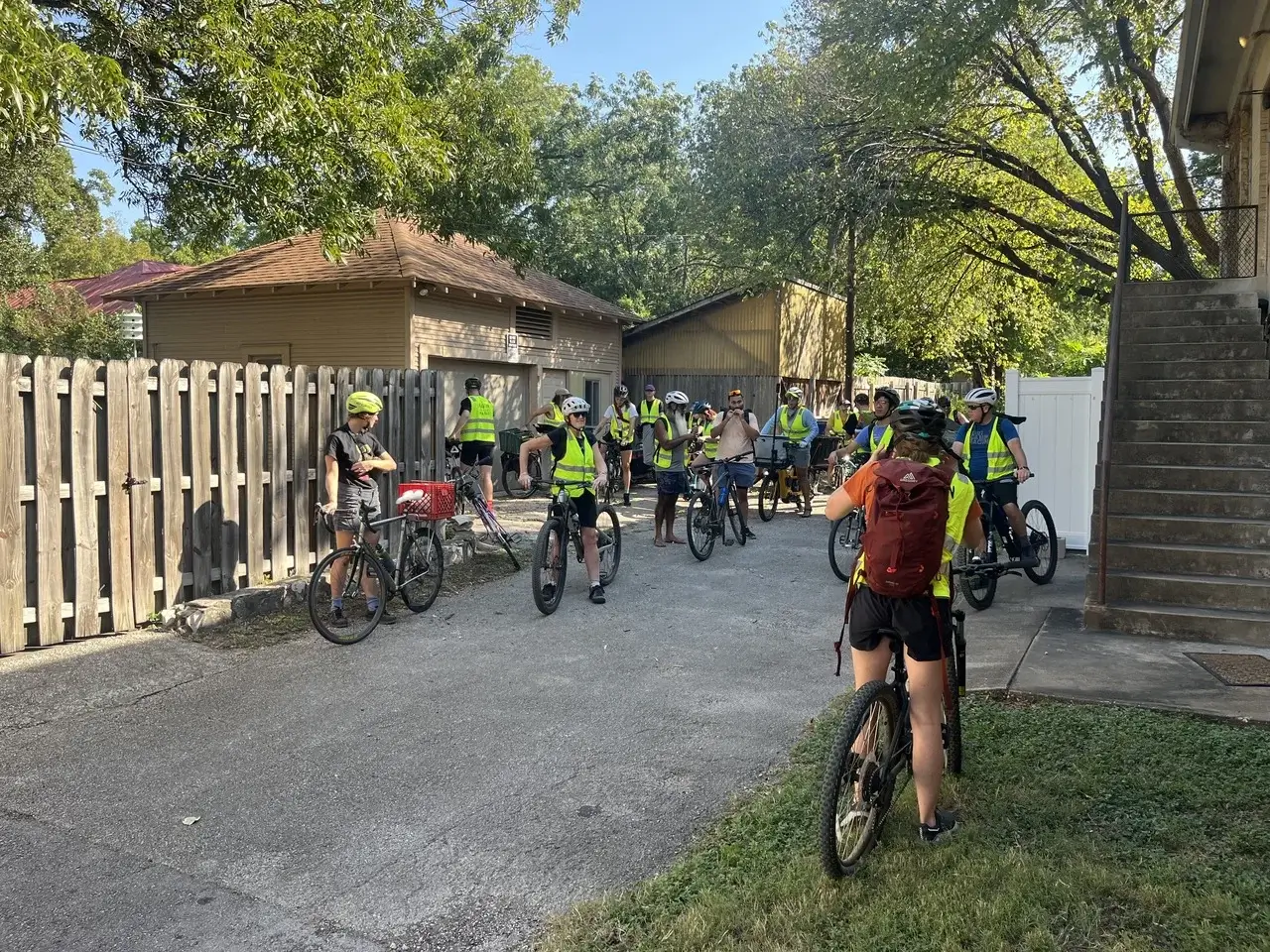
For co-founders Kelly Wourms and Claire Harbutt, the volunteer-based program is a way to give back to the community they call home, a place where a soaring cost of living and rapid gentrification is increasingly pricing many of its residents out of survival essentials. Climate-monitoring reports indicate that Austin’s residents are dealing with more and longer “hot spells”—or consecutive days of temperatures over 102.5 degrees Fahrenheit.
This makes staying fed and hydrated an even bigger challenge for the city’s most vulnerable population. So, every Wednesday and Saturday, rain or shine, heat or cold snap, ABM rides, handing out hundreds of meals a month.
READ MORE
What is a community fridge, and how did the trend start? Read our series here.
It’s a Saturday afternoon, which means ABM is headed out on a five-mile ride around the city. They start on South Congress Avenue, near the South Congress Hotel, and make their way into the heart of downtown. They loop around the Texas Capitol, head to the Austin Central Library, and finish up around Republic Square near the US Courthouse. On Wednesdays, their route is much longer, close to 14 miles. They usually head out to the East Side and work along Airport Boulevard on those days.

Being on two wheels rather than four allows them greater freedom of movement and access to those who rely on them most. While a car would be faster and have more storage space, bikes eliminate fuel expenses and emissions. They also allow ABM to serve people along Austin’s many trails near rivers and through parks, places that cars can’t access.
Bikes also allow for more visibility; people see the “Austin Bike Meals” vests and friendly faces, and they can relax knowing they’re being approached by allies.
Wourms, 31, moved to Austin from Los Angeles in 2021. While living in L.A., he was part of a volunteer group called Bicycle Meals, which followed a similar model and delivered meals around Koreatown. When Wourms moved to Austin, he wanted to find a way to carry on the tradition.
“I was friends with a few cyclists in town, I knew there was a pretty sizable unhoused population, and local laws regarding the unhoused population were pretty hostile,” says Wourms. “So, I thought this could be a good program to help mitigate that.”
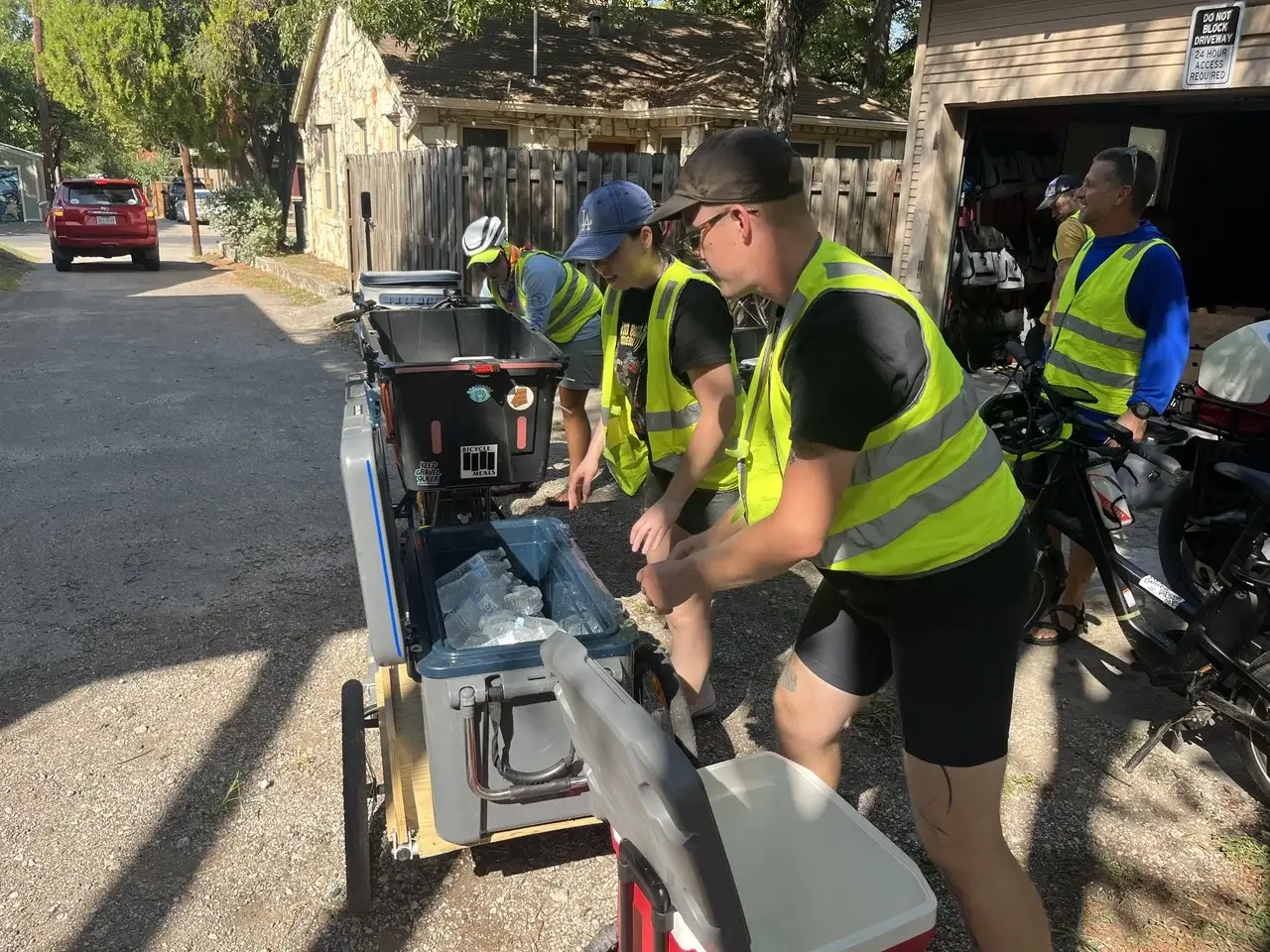
Withh Harbutt’s help, Wourms launched Bicycle Meals’ Austin branch out of his own pocket. The duo went on their first meal delivery ride together on Valentine’s Day of 2022. From then on, they would make 50 sack lunches to hand out every weekend—turkey sandwiches, chips, fruit, dessert, and a bottle of water.
Delivering prepared meals instantly made more sense to Wourms and Harbutt than creating boxes of ingredients the way food banks might. They wanted to deliver food that recipients without access to refrigeration or cooking supplies could eat immediately, wherever they were.
“I’ve worked with so many food banks where we’d be packing up groceries for people and I’d see volunteers packing boxes with three heads of lettuce, a bag of white bread, and some cookies,” Wourms recalls. “It pissed me off. I always said if I ever ran a food program, I would give out food that I would be excited to receive, and not just crap. Because that’s almost like getting less than nothing.”
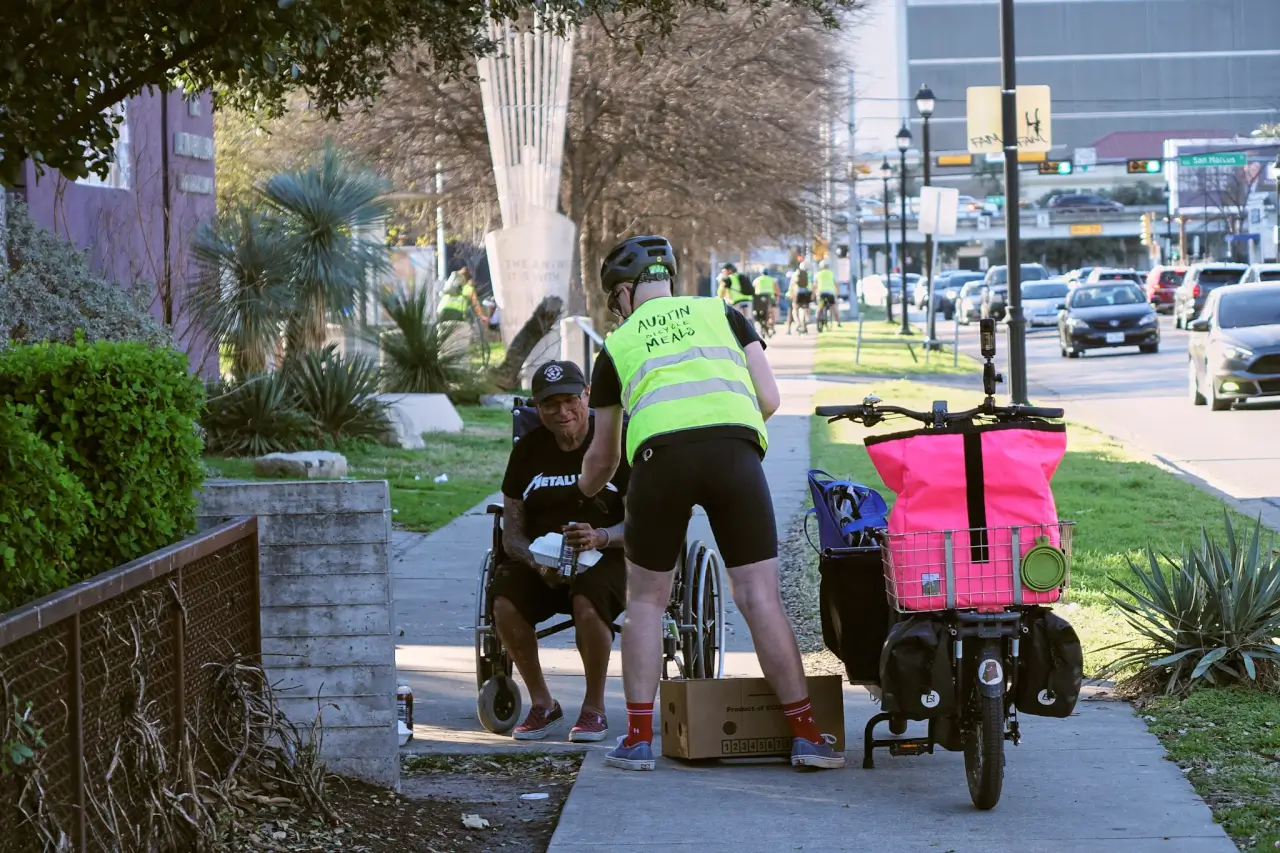
After roughly five months of weekly lunch preparation, Wourms and Harbutt recognized early signs of burnout.
“We were trying to start out, so, most of the time, it was just us, and occasionally some friends we could round up,” says Harbutt. “We were still making all the lunches, Kelly was paying for them, and then we’d also distribute them and it would take forever because no one would come out to help.”
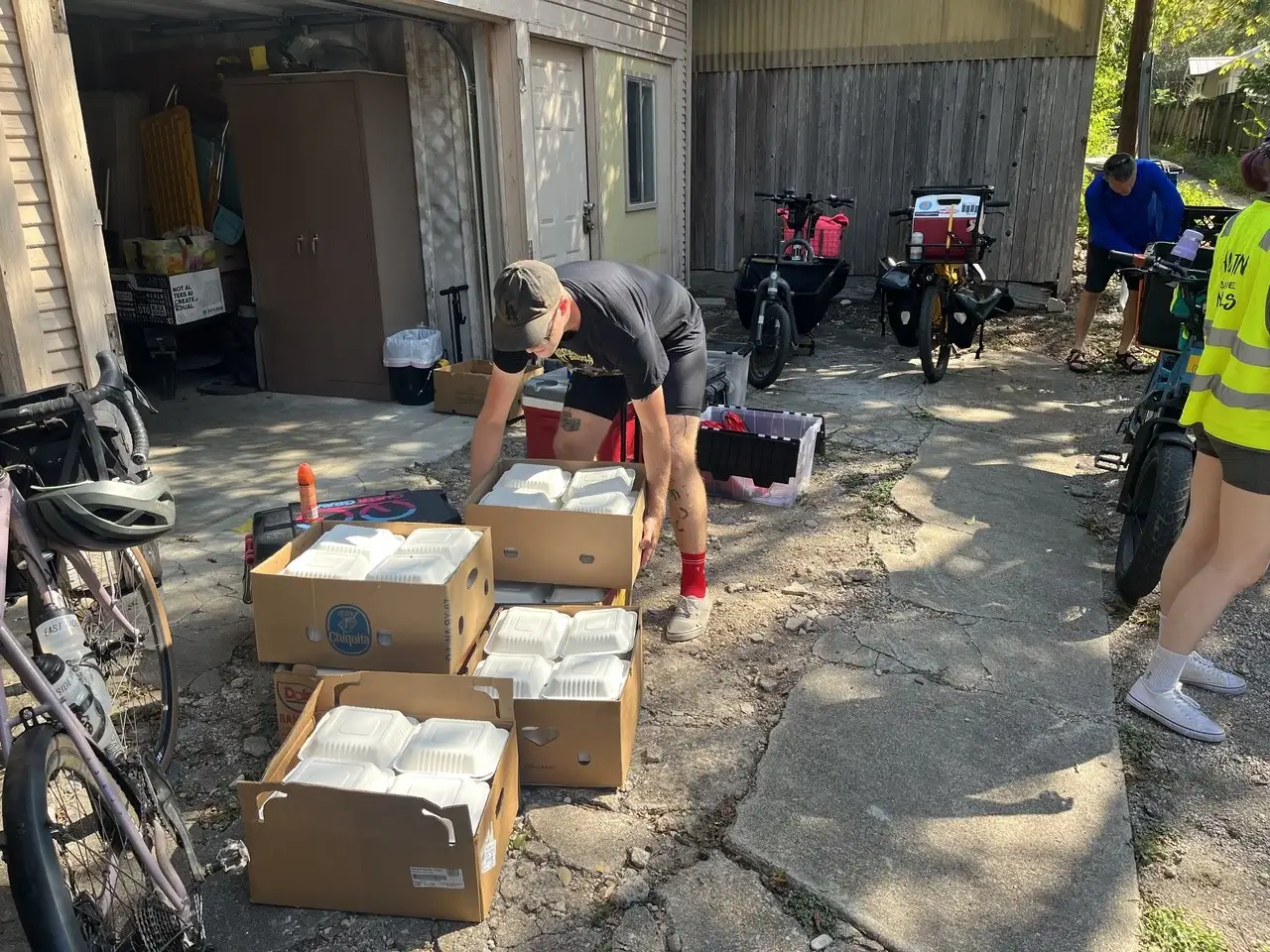
Wourms and Harbutt knew they needed to pivot some of the workload to keep the program sustainable over the long term. So, they made some changes.
Rather than buying and making meals, they partnered with Austin Food Not Bombs and started distributing hot meals from the long-established organization. ABM also partnered with Our Shared Kitchen, a non-profit dedicated to preparing nutritionally balanced meals for Austinites facing homelessness. Our Shared Kitchen also formulates meals that are edible for a wide range of people. “A lot of people we serve don’t have teeth,” says Wourms. “Or they can’t do spicy foods, or sweet foods, or salty foods. It’s tough to create a recipe that can be universally enjoyed.”
While ABM riders will sometimes run into folks with severe food allergies or restrictions, most of the time the food is a huge hit.
“Ninety-nine percent of people are just happy to receive help and feel compassion,” says Harbutt. “[We just] say we have free food, and ask them if they’d like any. You’ll see these people visibly relax when they realize we aren’t there to harass them, or yell at them for being on a bench we want to sit on. We aren’t there to do harm; we’re there to give them something they might want.”
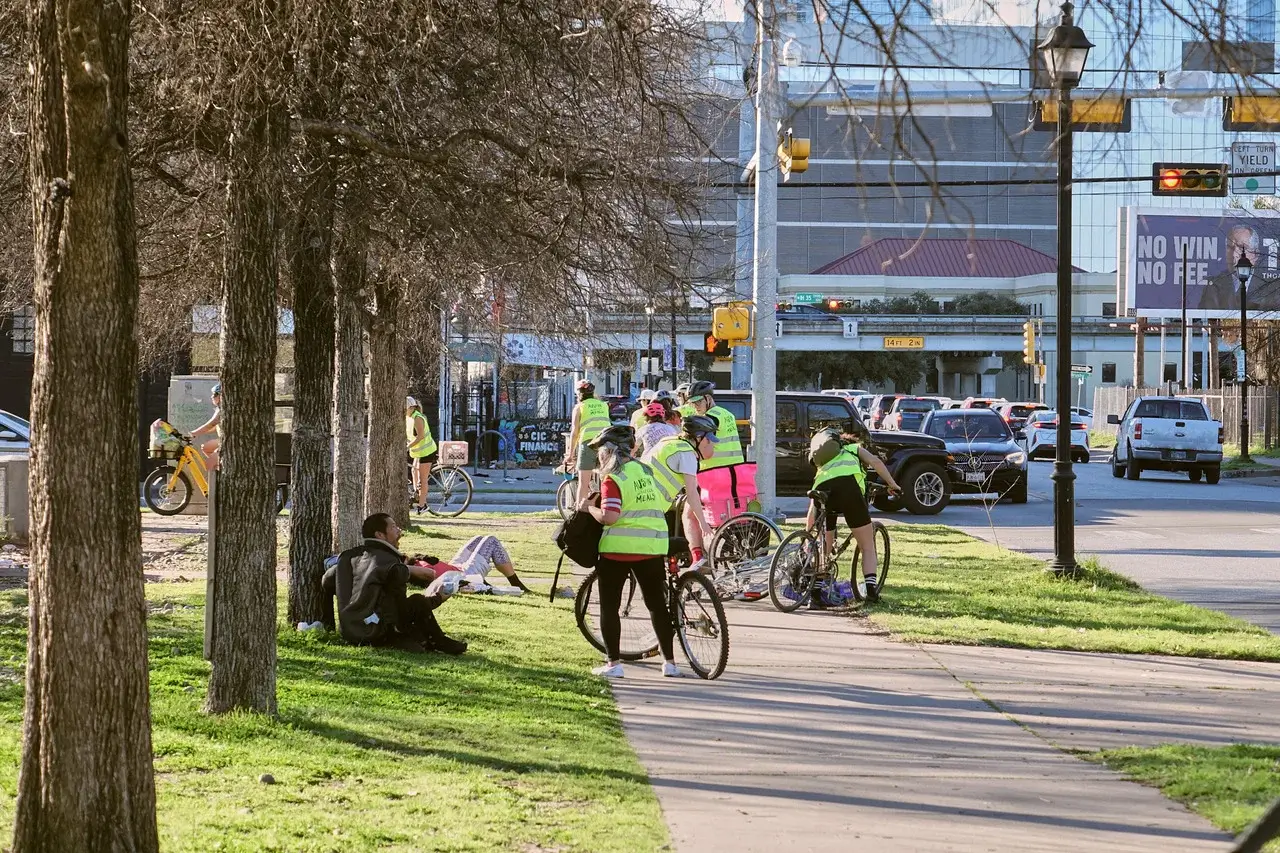
Today, ABM hands out roughly 500 meals a month. The group is well on its way to hitting its goal of 5,000 meals in 2024, and it already has its sights set on distributing 9,000 meals in 2025. Of course, these numbers wouldn’t be possible without the large volunteer network ABM has amassed. Eight to 12 volunteers show up to most rides, but, sometimes, there are as many as 20, far more than are needed to distribute the food. But that accessibility for volunteers is a key part of the program’s model: It reframes riders’ relationships with their unhoused neighbors.
“I came to a realization one day that, if I’m going to make a difference anywhere, it has to be locally and within the community immediately around me,” says Wourms. “We’ve had volunteers show up and feel so conditioned by how we view unhoused folks in this country, and they’ll do a full one-eighty. Their whole perspective will change. It’s really beautiful.”
Follow us
This work is licensed under a Creative Commons Attribution-NoDerivatives 4.0 International License.
Want to republish a Modern Farmer story?
We are happy for Modern Farmer stories to be shared, and encourage you to republish our articles for your audience. When doing so, we ask that you follow these guidelines:
Please credit us and our writers
For the author byline, please use “Author Name, Modern Farmer.” At the top of our stories, if on the web, please include this text and link: “This story was originally published by Modern Farmer.”
Please make sure to include a link back to either our home page or the article URL.
At the bottom of the story, please include the following text:
“Modern Farmer is a nonprofit initiative dedicated to raising awareness and catalyzing action at the intersection of food, agriculture, and society. Read more at <link>Modern Farmer</link>.”
Use our widget
We’d like to be able to track our stories, so we ask that if you republish our content, you do so using our widget (located on the left hand side of the article). The HTML code has a built-in tracker that tells us the data and domain where the story was published, as well as view counts.
Check the image requirements
It’s your responsibility to confirm you're licensed to republish images in our articles. Some images, such as those from commercial providers, don't allow their images to be republished without permission or payment. Copyright terms are generally listed in the image caption and attribution. You are welcome to omit our images or substitute with your own. Charts and interactive graphics follow the same rules.
Don’t change too much. Or, ask us first.
Articles must be republished in their entirety. It’s okay to change references to time (“today” to “yesterday”) or location (“Iowa City, IA” to “here”). But please keep everything else the same.
If you feel strongly that a more material edit needs to be made, get in touch with us at [email protected]. We’re happy to discuss it with the original author, but we must have prior approval for changes before publication.
Special cases
Extracts. You may run the first few lines or paragraphs of the article and then say: “Read the full article at Modern Farmer” with a link back to the original article.
Quotes. You may quote authors provided you include a link back to the article URL.
Translations. These require writer approval. To inquire about translation of a Modern Farmer article, contact us at [email protected]
Signed consent / copyright release forms. These are not required, provided you are following these guidelines.
Print. Articles can be republished in print under these same rules, with the exception that you do not need to include the links.
Tag us
When sharing the story on social media, please tag us using the following: - Twitter (@ModFarm) - Facebook (@ModernFarmerMedia) - Instagram (@modfarm)
Use our content respectfully
Modern Farmer is a nonprofit and as such we share our content for free and in good faith in order to reach new audiences. Respectfully,
No selling ads against our stories. It’s okay to put our stories on pages with ads.
Don’t republish our material wholesale, or automatically; you need to select stories to be republished individually.
You have no rights to sell, license, syndicate, or otherwise represent yourself as the authorized owner of our material to any third parties. This means that you cannot actively publish or submit our work for syndication to third party platforms or apps like Apple News or Google News. We understand that publishers cannot fully control when certain third parties automatically summarize or crawl content from publishers’ own sites.
Keep in touch
We want to hear from you if you love Modern Farmer content, have a collaboration idea, or anything else to share. As a nonprofit outlet, we work in service of our community and are always open to comments, feedback, and ideas. Contact us at [email protected].by Katie Hill, Modern Farmer
October 18, 2024
Modern Farmer Weekly
Solutions Hub
Innovations, ideas and inspiration. Actionable solutions for a resilient food system.
ExploreExplore other topics
Share With Us
We want to hear from Modern Farmer readers who have thoughtful commentary, actionable solutions, or helpful ideas to share.
SubmitNecessary cookies are absolutely essential for the website to function properly. This category only includes cookies that ensures basic functionalities and security features of the website. These cookies do not store any personal information.
Any cookies that may not be particularly necessary for the website to function and are used specifically to collect user personal data via analytics, ads, other embedded contents are termed as non-necessary cookies.
Its a good venture. Hope soon it becomes very popular. Some information on pricing would have made it wholesome reading and for the understanding of starting such activity in newer places around the world,